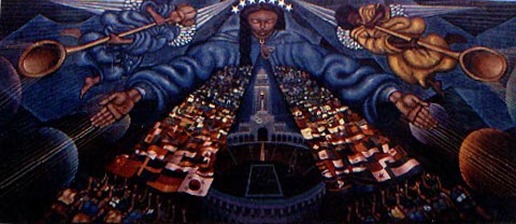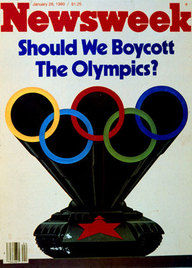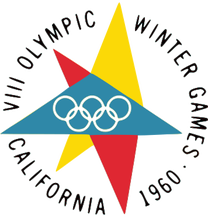Games of the XXIII Olympiad (1984 L.A. Summer Olympics)
& The Friendship Games (2 July - 16 September 1984)
 "Expo Park Welcomes the World" (1984)
by Jose Luis Gonzales and Robert Arenivar. *
"Expo Park Welcomes the World" (1984)
by Jose Luis Gonzales and Robert Arenivar. *
While there has been a long held belief in keeping politics out of Olympic competitions, there has also been a long held tradition of politicizing these international events. The Olympics have served as a political stage for numerous moments in history, such as Jesse Owens performance at the 1936 Berlin games, or the “Munich Massacre” of 1972. In the history of Cold War politics, the games were often a place where either country could prove the superiority of their Capitalist or Communist ideologies.
 Newsweek Cover (Jan. 1980)
Newsweek Cover (Jan. 1980)
Many in Los Angeles might remember their own Olympic Games in the summer of 1984, but few would consider it to have been a "Cold War event." However, on the same day that the Olympic torch left New York City, the Soviet Union initiated a boycott that would come to include numerous Communist-friendly countries. Although the U.S.S.R. claimed security concerns due to an “anti-Soviet hysteria”, the United States largely believed it to be payback for the U.S. boycott of the 1980 Olympic Games in Moscow. Resulting from an ultimatum given by President Jimmy Carter following the Soviet Invasion of Afghanistan in 1979, the boycott was just one of a group of actions that the United States would take to get the Soviet Union to withdraw troops from Afghanistan. As an alternative to the 1980 Summer Olympics in Moscow, the United States organized “The Liberty Bell Classic” (also referred to as Olympic Boycott Games), an event held at the University of Pennsylvania in Philadelphia. Beginning on July 16, shortly before the 1980 Summer Olympics opened on July 19, the Liberty Bell Classic included 29 other boycotting countries.
Like the 1980 U.S. Boycott, the U.S.S.R organized the “Friendship Games,” also known as “Friendship 84,” for the boycotting countries of the 1984 Los Angeles Olympics. In order to not upset the International Olympic Committee, the U.S.S.R. was careful not to market the games as an “alternative” Olympics. The events were even scheduled as not to coincide with the games in L.A., starting before and ending after, but pausing during the Games in Los Angeles. The games mostly consisted of boycotting countries, and countries that failed to qualify for Los Angeles, but teams were not grouped by country as in Olympic competition. While trying to be separate from the Olympics, at the same time, the relationship between the two events was obvious as ceremonies drew directly from Olympic ceremonies through the reuse of many elements built for the 1980 Moscow Olympics.
Like the 1980 U.S. Boycott, the U.S.S.R organized the “Friendship Games,” also known as “Friendship 84,” for the boycotting countries of the 1984 Los Angeles Olympics. In order to not upset the International Olympic Committee, the U.S.S.R. was careful not to market the games as an “alternative” Olympics. The events were even scheduled as not to coincide with the games in L.A., starting before and ending after, but pausing during the Games in Los Angeles. The games mostly consisted of boycotting countries, and countries that failed to qualify for Los Angeles, but teams were not grouped by country as in Olympic competition. While trying to be separate from the Olympics, at the same time, the relationship between the two events was obvious as ceremonies drew directly from Olympic ceremonies through the reuse of many elements built for the 1980 Moscow Olympics.

While the political climate of the Cold War influenced the Los Angeles games, it was not the first Olympic event in California to be effected. The 1960 Winter Olympics were held between February 18–28, 1960, in Squaw Valley, and were also influenced by Cold War tensions. In 1957 the United States government threatened to deny visas to athletes from Communist countries. The political debate concerning the relationships between China, Taiwan, North Korea and East Germany, as they related to the Soviet Union and the U.S., had led to questions of inclusion and exclusion that threatened the event. In the end, the President of the IOC threatened to revoke Squaw Valley's right to host the games, and the United States conceded.
* "Expo Park Welcomes the World" mural is located at the corner of Leighton and Vermont in Los
Angeles, adjacent to the Colosseum.

